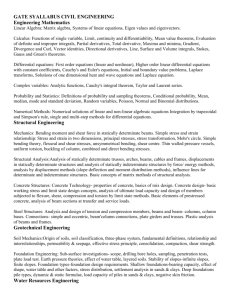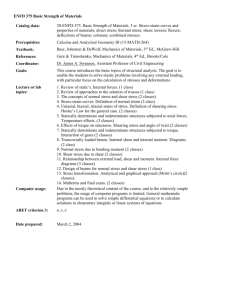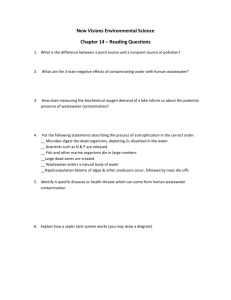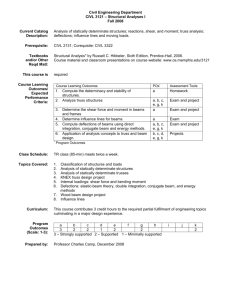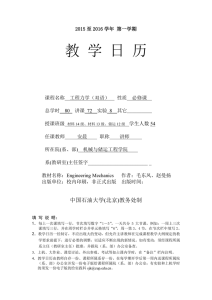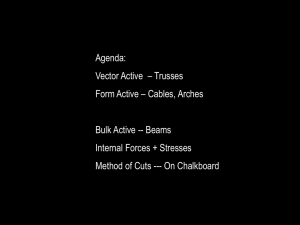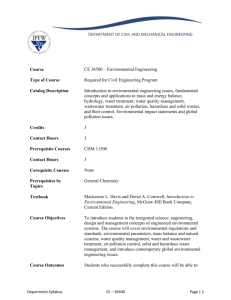Syllabus for Entrance Examination for Full Time Ph.D. Research
advertisement
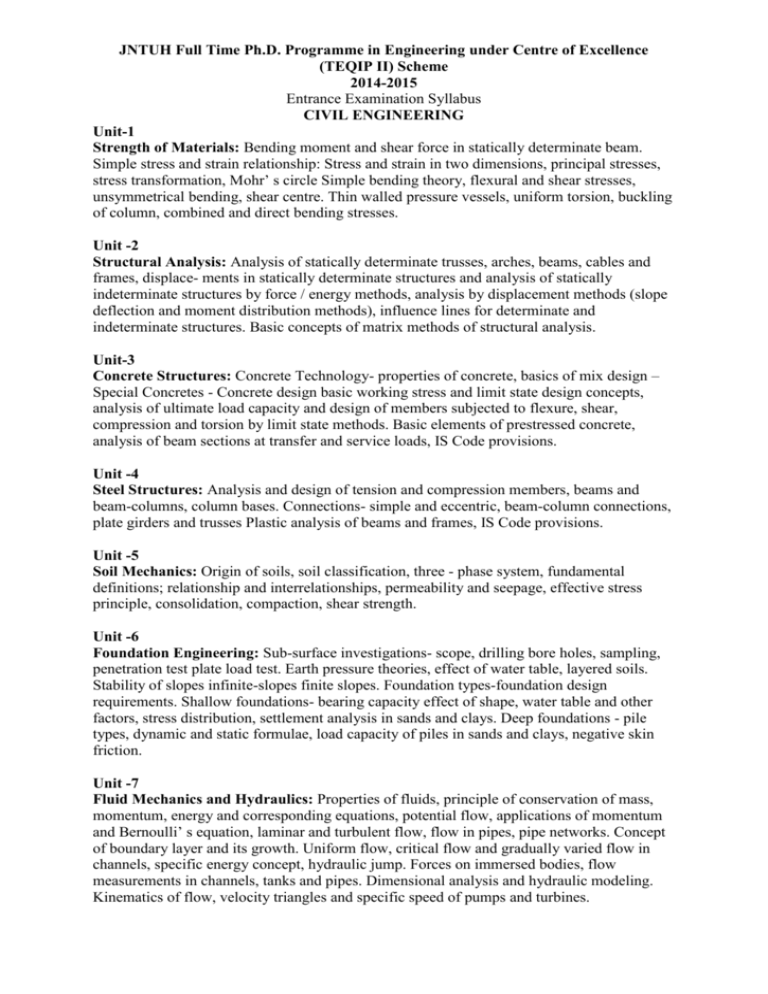
JNTUH Full Time Ph.D. Programme in Engineering under Centre of Excellence (TEQIP II) Scheme 2014-2015 Entrance Examination Syllabus CIVIL ENGINEERING Unit-1 Strength of Materials: Bending moment and shear force in statically determinate beam. Simple stress and strain relationship: Stress and strain in two dimensions, principal stresses, stress transformation, Mohr’ s circle Simple bending theory, flexural and shear stresses, unsymmetrical bending, shear centre. Thin walled pressure vessels, uniform torsion, buckling of column, combined and direct bending stresses. Unit -2 Structural Analysis: Analysis of statically determinate trusses, arches, beams, cables and frames, displace- ments in statically determinate structures and analysis of statically indeterminate structures by force / energy methods, analysis by displacement methods (slope deflection and moment distribution methods), influence lines for determinate and indeterminate structures. Basic concepts of matrix methods of structural analysis. Unit-3 Concrete Structures: Concrete Technology- properties of concrete, basics of mix design – Special Concretes - Concrete design basic working stress and limit state design concepts, analysis of ultimate load capacity and design of members subjected to flexure, shear, compression and torsion by limit state methods. Basic elements of prestressed concrete, analysis of beam sections at transfer and service loads, IS Code provisions. Unit -4 Steel Structures: Analysis and design of tension and compression members, beams and beam-columns, column bases. Connections- simple and eccentric, beam-column connections, plate girders and trusses Plastic analysis of beams and frames, IS Code provisions. Unit -5 Soil Mechanics: Origin of soils, soil classification, three - phase system, fundamental definitions; relationship and interrelationships, permeability and seepage, effective stress principle, consolidation, compaction, shear strength. Unit -6 Foundation Engineering: Sub-surface investigations- scope, drilling bore holes, sampling, penetration test plate load test. Earth pressure theories, effect of water table, layered soils. Stability of slopes infinite-slopes finite slopes. Foundation types-foundation design requirements. Shallow foundations- bearing capacity effect of shape, water table and other factors, stress distribution, settlement analysis in sands and clays. Deep foundations - pile types, dynamic and static formulae, load capacity of piles in sands and clays, negative skin friction. Unit -7 Fluid Mechanics and Hydraulics: Properties of fluids, principle of conservation of mass, momentum, energy and corresponding equations, potential flow, applications of momentum and Bernoulli’ s equation, laminar and turbulent flow, flow in pipes, pipe networks. Concept of boundary layer and its growth. Uniform flow, critical flow and gradually varied flow in channels, specific energy concept, hydraulic jump. Forces on immersed bodies, flow measurements in channels, tanks and pipes. Dimensional analysis and hydraulic modeling. Kinematics of flow, velocity triangles and specific speed of pumps and turbines. Unit -8 Hydrology: Hydrologic cycle, rainfall, evaporation, infiltration, stage discharge relationships, unit hydrographs, flood estimation, reservoir capacity, reservoir and channel routing. Well hydraulics. Unit -9 Irrigation: Duty, delta, estimation of evapo-transpiration. Crop water requirements. Design of: lined and unlinedcanals, waterways, head works, gravity dams and spillways. Design of weirs on permeable foundation. Types of irrigation system, irrigation methods. Water logging and drainage, sodic soils. Unit -10 ENVIRONMENTAL ENGINEERING Water requirements: Quality standards, basic unit processes and operations for water treatment. Drinking water standards, water requirements, basic unit operations and unit processes for surface water treatment, distribution of water. Sewage and sewerage treatment, quantity and characteristics of wastewater. Primary, secondary and tertiary treatment of wastewater, sludge disposal, effluent discharge standards. Domestic wastewater treatment, quantity of characteristics of domestic wastewater, primary and secondary treatment Unit operations and unit processes of domestic wastewater, sludge disposal. Air Pollution: Types of pollutants, their sources and impacts, air pollution meteorology, air pollution control, air quality standards and limits. Municipal Solid Wastes: Characteristics, generation, collection and transportation of solid wastes, engineered systems for solid waste management (reuse/recycle, energy recovery, treatment and disposal). Noise Pollution: Impacts of noise, permissible limits of noise pollution, measurement of noise and control of noise pollution. Unit -11 TRANSPORTATION ENGINEERING Highway Planning: Geometric design of highways, testing and specifications of paving materials, design of flexible and rigid pavements. Traffic Engineering: Traffic characteristics, theory of traffic flow, intersection design, traffic signs and signal design, highway capacity. Note: For Transportation Engineering specialisation, Weightage may be given 50% for the units 1to 6.For units 7 to 11 remaining weightage of 50% may be given for the written test. HCED PRINCIPAL JNTUH Full Time Ph.D. Programme in Engineering under TEQIP II Scheme 2014-2015 Entrance Examination Syllabus MECHANICAL ENGINEERING Unit-1: Thermodynamics. Laws. Properties of ideal and real gases and vapors, Power Cycles, Gas Power Cycle, Gas Turbine Cycles, Fuels and Combustion. Unit-2: I. C. Engine. C.I and S.I. Engines, Detonation. Fuel injection and carburetion. Performance and Testing. Turbo prop. Engines, Rocket Engines. Elementary knowledge of Nuclear Power Plants and Nuclear Fuels. Unit-3: Steam Boilers, Engines, Nozzles and Steam Turbines. Modern boilers. Steam Turbines, Types. Flow of steam thorough nozzles. Velocity diagrams for Impulse and Reaction Turbines. Efficiencies and Governing. Unit-4: Compressors, Gas Dynamics and Gas Turbines. Reciprocating, centrifugal and axial flow compressors. Energy transfer equation. Velocity diagrams. Efficiency and Performance. Gas Turbine Cycle with multistage compression. Reheating and Regeneration. Unit-5: Heat Transfer, Refrigeration and Air Conditioning. Conduction. Convection and Radiation. Heat Transfer, Heat Exchangers, Boiling and condensation. Refrigeration and heat pump cycles. Refrigeration systems. Coefficient of performance. Psychometric and psychometric chart. Comfort indices. Cooling and dehumidification methods. Industrial Air-conditioning Processes. Cooling and heating loads calculations. Unit-6: Fluid Mechanics and Machines. Fluids-Properties, Pressure. Forces, Buoyancy and stability. Laminar and turbulent flow, equation of continuity. Energy and momentum equation. Bernoulli s Theorem. Dimensional analysis. Critical Reynolds number Layer concepts. Film lubrication. Incompressible flow through pipes, critical velocity. Friction loss due to sudden enlargement and contraction. Compressible flow through nozzles. Unit-7: Theory of Machines. Velocity and acceleration of moving bodies; in machines. Inertia forces in machines. Cams; Gears and Geartrains, Flywheels and Governors. Balancing of Rotating and Reciprocating Masses. Free and Forced vibrations of systems. Critical speeds and whirling of shafts. Unit-8: Machine Design. Design of : Joints-Threaded fasteners and Power Screws-Keys, Cotters, Couplings-Welded Joints. Transmission system :-Belt and chain drives-wire ropes-shafts. Gears-Sliding and Rolling bearings. Unit-9: Engineering Mechanics. Forces and moments-Equilibrium and analysis of force systems-friction-centre of gravity, moment of Innertia-Kinetics. Unit-10: Strength of Materials. Stress and strain in two dimension ; Mohr s circles ; Relations between Elastic Constants. Beams :- Bending Moments, Shear forces and deflection. Shafts :- Combined bending, Direct and torsional stresses. Thick :-Walled cylinders and spheres under Pressure, Spring, Struts and Columns. Theories of failure. Unit-11: Engineering Materials. Alloys and Alloying Materials, Heat treatment ; Composition Properties and uses. Plastics and other newer engineering materials. Unit-12: Metallurgy. Phase diagrams of Alloy systems, Iron carbon system, Solidification, Heat treatment Processes. Unit-13: Production Engineering. Metals Machining :-Cutting tools ; Tool Materials, Wear and Machinability, Measurement of cutting forces. Process :- Machining-Grinding, Boring, Gear Manufacturing, Metal forming, Metal Casting and Joining, Basic special purpose Programme and Numerically controlled machine Tools, Jigs and Fixtures (locating elements). Unit-14: Welding Proceres. Gas welding, Arc welding, resistance welding-welding equipment. Unit-15: Industrial Engineering. Work study and work measurement. Wage incentive. Design of Production Systems and Product Cost. Principals of plant Layout. Production Planning and Control. Material Handling. Operations Research. Linear Programming. Queuing Theory. Value Engineering. Network Analysis. CPM and PERT. Use of Computers. Note: For Advanced Manufacturing Systems Stream, Weightage may be given 50% for the Units of 1 to 10. For units 11-15, remaining Weightage of 50% for the Written Test HMED PRINCIPAL
